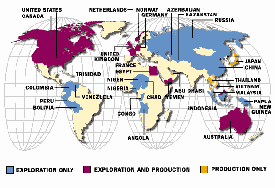|
A tale of two giants
|
 |
November 30, 1998: 9:33 p.m. ET
Exxon, Mobil were once partners in Rockefeller's dominant Standard Oil
|
NEW YORK (CNNfn) - They were partners once before, with the power to dominate the oil industry like no other firm on the face of the earth.
And, if all goes as planned, Exxon Corp. and Mobil Corp. could once again join forces in a blockbuster $80 billion deal that would send tremors through the oil patch.
According to people familiar with the talks, the companies could announce an agreement as early as Tuesday, setting the stage for what would be the largest industrial merger of all time.
Not since the dawn of the industrial revolution has the world oil industry faced such a juggernaut – a firm with almost 21 billion barrels of oil and gas reserves, enough to satisfy the world's energy needs for more than a year, and the ability to turn 6.6 million barrels a day of raw crude oil into heating oil, gasoline or jet fuel.
Second to Saudi Arabia and Iran
In fact, a merged Exxon-Mobil would put the combined company behind only Saudi Arabia and Iran in terms of output.
At the same time, a combination would allow the companies to handle the tumultuous world of oil prices better than if they had to go it alone.
"It's not so much that bigger is better. I think what you're looking at is a company that's suddenly head and shoulders above most of the other companies," said Kate Warne, oil analyst at A.G. Edwards. "And two very efficient competitors that have already cut a lot of their own costs and are now looking at better ways of going after their current business."
 Exxon has exploration and production facilities all over the globe. (Source: Exxon Corp.) Exxon has exploration and production facilities all over the globe. (Source: Exxon Corp.)
Indeed, with oil prices slumping to 12-year lows and no recovery expected any time soon, even the titans of the oil patch are being forced to consider alliances, mergers and painful job cuts to remain competitive.
"We don't think oil prices are going to rebound sharply," said Bruce Lanni, oil analyst at CIBC Oppenheimer. "I think the deal that Mobil's doing is suggesting just that. I think most companies are hunkering down and they expect that prices are going to remain low for the next possibly one to three years. In this event, you may start to see more mergers occur."
On Monday, Texaco Inc. (TX) and Royal Dutch Shell announced that negotiations on a proposed combination of their refining and marketing operations had ended because the proposed plan would not "maximize shareholder value at both companies.
However, industry analysts said the announcement could mean both companies are now considering a full-blown merger, rather than an alliance, to combat the possibility of an Exxon-Mobil juggernaut.
"They may not be just forming an alliance but instead merging where they won't have different mindsets but a single set of goals," said oil analyst Fadel Gheit at Fahnestock & Co. "A full merger will see better returns.
"Alliances are temporary engagement periods and are short of a merger, but they get in the way of the business and are distracting from bigger and better things," Gheit added.
Back to the future?
For Exxon and Mobil, a merger also would bring the companies back to their roots when they were part of John Rockefeller's Standard Oil empire. That company was the largest oil firm in the world before it was busted up by the government in 1911.
Industry analysts predict the combination of Exxon and Mobil would almost certainly face stiff scrutiny from antitrust regulators who feel the two firms would have considerable power to boost gasoline prices, particularly in the northeast United States where Exxon and Mobil have a substantial number of gasoline stations.
Perhaps to allay those concerns, the companies reportedly are working on a plan that would include some $3 billion in cost savings and about 12,000 job cuts.
While some industry analysts expect the deal to be an all-stock offer, others suggested Exxon may need to strengthen the deal with a little cash in order to get Mobil to agree to a merger.
"I think Exxon would probably have to sweeten the deal with some cash, but Exxon stock is an extremely good currency for Mobil shareholders to hold," said Fahnestock's Gheit.
Fred Leuffer, oil analyst at Bear Stearns, said in a research report an all-stock deal at $100 per share would put a value of $8 per barrel of proven and probable reserves for Mobil, well above the industry's finding and development costs.
"Although acquiring Mobil on these bases hardly seems like a bargain, our 1999 projections indicate the transaction would be accretive to Exxon's earnings and cash flow," he said.
But Leuffer cautioned that apart from a one-time boost to earnings per share of 30 cents in 1999, around 10 percent, the merger would not significantly improve Exxon's growth rate.
"Bigger, by itself, is not better. If you question this, just ask the management of Royal Dutch, where size has not helped the company's competitiveness," he said.
Exxon (XON) closed Monday at 75, up 5/8 while Mobil (MOB) closed at 86, unchanged.
-- from staff and wire reports
|
|
|
Exxon
Mobil
|
Note: Pages will open in a new browser window
External sites are not endorsed by CNNmoney
|
|
|
|
 |

|

